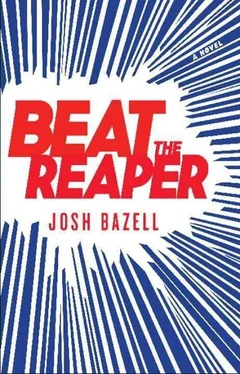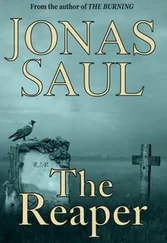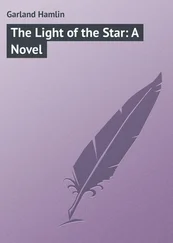Snake staff on the left, Star of David on the right. [3] The tattoo on my left shoulder—winged staff, two snakes—turns out to actually be the symbol of Hermes, and therefore of commerce. The symbol of Asclepius, and therefore of medicine, is a nonwinged staff with one snake. Who knew?
“You’re from Oklahoma?” I ask her.
“Well yes I am.”
“You’re twenty-two?”
“I wish. Twenty-four.”
“You took a couple of years off.”
“Yes, but oh my God that is a boring story.”
“It’s okay so far. What’s your name?”
“St aaaaa cey,” she says, stepping closer with her arms behind her back.
I should say here that being chronically sleep-deprived is so demonstrably similar to being drunk that hospitals often feel like giant, ceaseless office Christmas parties. Except that at a Christmas party the schmuck standing next to you isn’t about to fillet your pancreas with something called a “hot knife.”
I should also maybe say that drug reps, of whom there is one for every seven physicians in the U.S., get paid to be flirtatious. Or else to actually fuck you—I’ve never been quite clear on that.
“What company do you work for?” I ask.
“Martin-Whiting Aldomed,” she says.
“Got any Moxfane?”
Moxfane is the drug they give to bomber pilots who need to take off from Michigan, bomb Iraq, then fly back to Michigan without stopping. You can swallow it or use it to run the engine.
“Well yes I do. But what are you gonna give me in return?”
“What do you want?” I say.
She’s right up under me. “What do I want? If I start thinking about that, I’ll start crying. Don’t tell me you want to see that.”
“Beats going to work.”
She gives me the play slap and leans over to unzip her bag. If she’s wearing underwear, it’s not of any technology I’m familiar with. “Anyway,” she says, “it’s just things like a career . Or not having three roommates. Or not having parents who think I should have stayed in Oklahoma. I don’t know that you can help me with that.”
She stands up with a sample pack of Moxfane and a pair of Dermagels, the Martin-Whiting Aldomed eighteen-dollar rubber gloves. She says, “In the meantime, I might settle for showing you our new gloves.”
“I’ve tried them,” I say.
“Have you ever tried kissing someone through them?”
“No.”
“Neither have I. And I’ve kind of been dying to.”
She hip-checks the elevator “stop” button. “Oops,” she says.
She bites the cuff of one of the gloves to tear it open, and I laugh. You know that feeling where you’re not sure whether you’re being hustled or in the presence of an actual human being?
I love that feeling.
“The ward is a fucking nightmare,” Akfal, the other intern on my service, says when I finally show up to relieve him. What “Hello” is to civilians, “The ward is a fucking nightmare” is to interns.
Akfal is a J-Card from Egypt. J-Cards are graduates of foreign medical schools whose visas can be rescinded if they don’t keep their residency directors happy. Another good word for them would be “slaves.” He hands me a printout of current patients—he’s got one too, though his is marked up and heavily creased—and talks me through it. Blah blah Room 809 South. Blah blah colostomy infection. Blah thirty-seven-year-old woman for regularly scheduled chemotherablah. Blah blah blah blah blah. It’s impossible to follow, even if you wanted to.
Instead I’m leaning back against the nursing station desk, which is reminding me that I’m still carrying a handgun in the inside pocket of my scrub pants. [4] Scrub suits are reversible, with pockets on both sides, in case you need to run anesthesia or whatever but are too tired to put your pants on correctly.
I need to stash the gun somewhere, but the locker room is four floors away. Maybe I should hide it behind some textbooks in the nurses’ lounge. Or under the bed in the call room. It doesn’t really matter, as long as I can focus enough to remember where I put it later.
Eventually Akfal stops talking. “Got it?” he asks me.
“Yeah,” I say. “Go home and get some sleep.”
“Thanks,” Akfal says.
Akfal will neither go home nor get some sleep. Akfal will go do insurance paperwork for our residency director, Dr. Nordenskirk, for at least the next four hours.
It’s just that “Go home and get some sleep” is intern for “Goodbye.”
Rounding on patients at five thirty in the morning usually turns up at least a handful of people who tell you they’d feel fine if only you assholes would stop waking them up every four hours to ask them how they’re feeling. Other people will keep this observation to themselves, and bitch instead about how someone keeps stealing their mp3 player or medications or whatever. Either way, you give the patient the once-over, keeping a particularly sharp lookout for “iatrogenic” (physician caused) and “nosocomial” (hospital caused) illnesses, which together are the eighth leading cause of death in the United States. Then you flee.
The other thing that sometimes happens when you round early on patients is that none of them complain at all.
Which is never a good sign.
The fifth or sixth room I enter is that of Duke Mosby, easily the patient I currently hate least. He’s a ninety-year-old black male in for diabetes complications that now include gangrene of both feet. He was one of ten black Americans who served in Special Forces in World War II, and in 1944 he escaped from Colditz. Two weeks ago he escaped from this very room at Manhattan Catholic Hospital. In his underpants. In January. Hence the gangrene. Diabetes fucks your circulation even if you wear, say, shoes. Thankfully, Akfal was on shift at the time.
“What’s going on, Doc?” he says to me.
“Not much, sir,” I tell him.
“Don’t call me sir. I work for a living,” he says. He always says this. It’s some kind of army joke, about how he wasn’t a commissioned officer or something. “Just give me some news, Doc.”
He doesn’t mean about his health, which rarely seems to interest him, so I make up some shit about the government. He’ll never find out differently.
As I start bandaging his reeking feet, I say, “Also, I saw a rat fighting a pigeon on my way to work this morning.”
“Yeah? Who won?”
“The rat,” I tell him. “It wasn’t even close.”
“Guess it figures a rat could take a pigeon.”
I say, “The weird thing was that the pigeon kept trying, though. It had its feathers all puffed out and it was covered with blood. Every time it attacked, the rat would just bite it once and throw it onto its back. Go mammals, I guess, but it was pretty disgusting.” I put my stethoscope on his chest.
Mosby’s voice booms in through the earpieces. “That rat must have done something pretty bad to that pigeon to make it keep on like that.”
“Doubtless,” I say. I push his abdomen around, trying to elicit pain. Mosby doesn’t seem to notice. “Seen any of the nurses this morning?” I ask him.
“Sure. They been in and out all the time.”
“Any of the ones in the little white skirts, with the hats?”
“Many times.”
Uh huh. You see a woman dressed like that, it’s not a nurse, it’s a strip-o-gram. I feel the glands around Mosby’s neck.
“I got a joke for you, Doc,” Mosby says.
“Yeah? What’s that?”
“Doctor says to a guy, ‘I got two pieces of bad news for you. First one is, you got cancer.’ Man says, ‘Lordy! What’s the second one?’ Doctor says, ‘You got Alzheimer’s.’ Man says, ‘Well, at least I don’t have cancer!’”
Читать дальше










